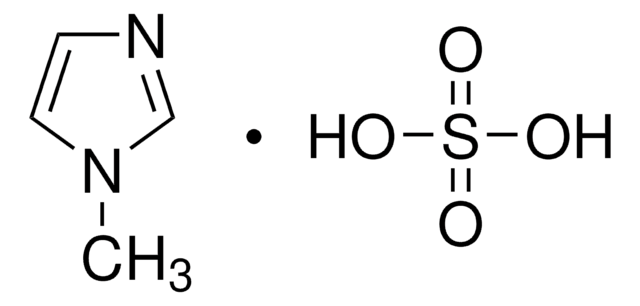40477
1-Methylimidazolium chloride
95%
Synonym(s):
1-Methylimidazole hydrochloride
Sign Into View Organizational & Contract Pricing
All Photos(1)
About This Item
Empirical Formula (Hill Notation):
C4H6N2 · HCl
CAS Number:
Molecular Weight:
118.56
MDL number:
UNSPSC Code:
12352100
PubChem Substance ID:
NACRES:
NA.22
Recommended Products
Quality Level
Assay
≥94.5% (HPLC)
95%
impurities
≤1% water
SMILES string
Cl[H].Cn1ccnc1
InChI
1S/C4H6N2.ClH/c1-6-3-2-5-4-6;/h2-4H,1H3;1H
InChI key
STCBHSHARMAIOM-UHFFFAOYSA-N
Application
1-Methylimidazolium chloride behaves as a solvent and catalyst during the formation of 5-hydroxymethylfurfural from fructose and sucrose via acid-catalyzed dehydration.
Signal Word
Warning
Hazard Statements
Precautionary Statements
Hazard Classifications
Acute Tox. 4 Oral - Eye Irrit. 2 - Skin Irrit. 2 - STOT SE 3
Target Organs
Respiratory system
Storage Class Code
11 - Combustible Solids
WGK
WGK 3
Flash Point(F)
Not applicable
Flash Point(C)
Not applicable
Personal Protective Equipment
dust mask type N95 (US), Eyeshields, Gloves
Choose from one of the most recent versions:
Already Own This Product?
Find documentation for the products that you have recently purchased in the Document Library.
Customers Also Viewed
Dehydration of fructose and sucrose into 5-hydroxymethylfurfural in the presence of 1-H-3-methyl imidazolium chloride acting both as solvent and catalyst.
Moreau C, et al.
J. Mol. Catal. A: Chem., 253(1), 165-169 (2006)
Ariyanti Sarwono et al.
Ultrasonics sonochemistry, 37, 310-319 (2017-04-22)
5-Hydroxymethylfurfural (HMF) has been identified as a promising biomass-derived platform chemical. In this study, one pot production of HMF was studied in ionic liquid (IL) under probe sonication technique. Compared with the conventional heating technique, the use of probe ultrasonic
Zhuang Wang et al.
Chemosphere, 185, 681-689 (2017-07-21)
Graphene and ionic liquids (ILs) released into the environment will interact with each other. So far however, the risks associated with the concurrent exposure of biota to graphene and ILs in the environment have received little attention. The research reported
Najeh Maaloul et al.
Environmental science and pollution research international, 27(19), 23447-23463 (2019-01-04)
In this study, novel cellulose-bead-based biosorbents (CBBAS) were successfully synthesized from almond shell using a simple three-step process: (i) dissolution of bleached almond shell in ionic liquid (1-butyl-3-methylimidazolium chloride), (ii) coagulation of cellulose-ionic liquid solution in water and (iii) freeze-drying.
Pankaj Attri et al.
PloS one, 8(7), e68970-e68970 (2013-07-23)
In this paper, we have examined the conductivity and interaction studies of ammonium and imidazolium based ionic liquids (ILs) with the newly synthesised low bandgap polymer (Poly(2-heptadecyl-4-vinylthieno[3,4-d]thiazole) (PHVTT)). Use of low bandgap polymers is the most suitable way to harvest
Our team of scientists has experience in all areas of research including Life Science, Material Science, Chemical Synthesis, Chromatography, Analytical and many others.
Contact Technical Service













